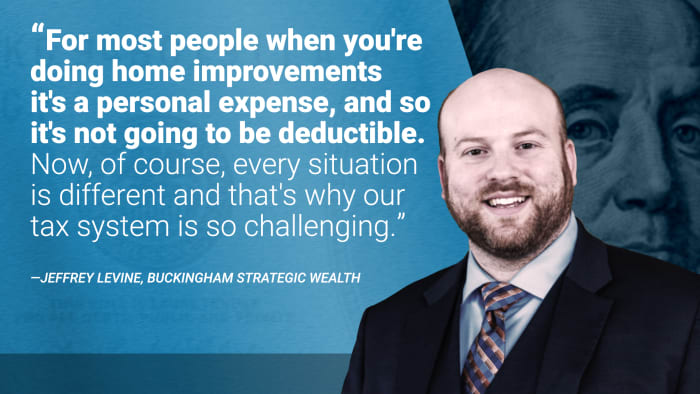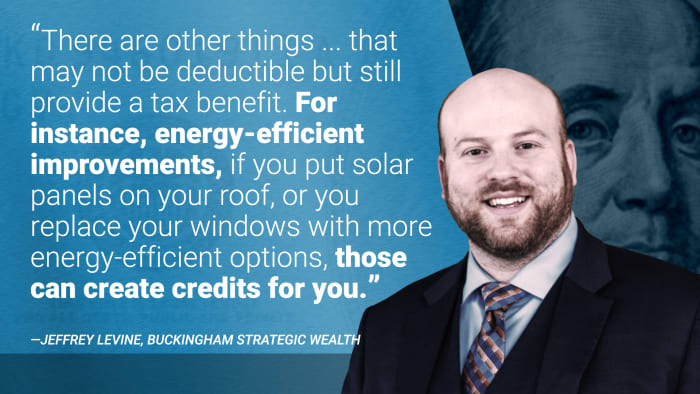It’s a frequently asked question, “Are my home improvements tax-deductible? “For most people when you’re doing home improvements it’s a personal expense.” according to Jeffrey Levine, CPA and Tax Expert at Buckingham Strategic Wealth, “and so it’s not going to be deductible.”.
“Every situation is different and that’s why our tax system is so challenging because everything centers around facts and circumstances,” says Levine. Here are some examples of home improvements that may have tax benefits.
Recommended: Home Improvements and Your Taxes
What Are Some Improvements With Tax Benefits?
- An elevator was installed because there is a medical need
- Solar panels or other energy-efficient improvements
- A home office that qualifies as a business deduction
There are also some “expenses that may help you reduce your taxes in the year you sell your house,” according to our partners at TurboTax. These expenses are called Capital Improvements.
What are Capital Improvements?
A capital improvement is when there is a significant change to your property. This change or alteration is required to meet the following criteria:
- The improvement or alteration must add significant value to the real property. It could also substantially extend the life of a property.
- The improvement is permanent and would cause damage if removed.
- The intent is to make this improvement or alteration permanent.
The IRS.com website says to keep receipts or other proof of improvements and there is a table to record and track all of your improvements or alterations.
Recommended: Keeping Good Tax Records
TurboTax Live experts look out for you. Expert help your way: get help as you go, or hand your taxes off. You can talk live to tax experts online for unlimited answers and advice OR, have a dedicated tax expert do your taxes for you, so you can be confident in your tax return. Enjoy up to an additional $20 off when you get started with TurboTax Live.
Read further for the extended conversation between Retirement Daily’s Robert Powell and Levine.
Video Transcript| Jeffrey Levine, CPA and Tax Expert, Buckingham Strategic Wealth
Robert Powell: Welcome to TheStreet’s tax tips with Jeffrey Levine from Buckingham Wealth Partners. So during Covid, many people were improving their homes, are there any sort of tax planning opportunities for those home improvements?
Jeffrey Levine: You know, for most people when you’re doing home improvements it’s a personal expense and so it’s not going to be deductible. Now, of course, every situation is different and that’s why our tax system is so challenging because everything centers around facts and circumstances.
Scroll to Continue
What Medical Expenses Have Tax Benefits?
For instance, most people if you went to put an elevator in your home, right, that would be a nice thing to have, but you don’t need it. But if you, let’s say, we’re in a position where you were dependent, were disabled, and you needed that elevator as a medical expense. Well, then, to the extent that the elevator, the money that you spend on that elevator does not improve the overall value of your property.
So, for instance, let’s say your house is worth $500,000, you spend $50,000 to put an elevator in, and an appraiser comes back afterward and says $510,000. In other words, your $50,000 expense boosted your property value by $10,000 but most people don’t really value an elevator, so it’s not giving it the full 50. Well, that $40,000 becomes a medical expense that could potentially be deductible on your return if it, along with your other medical expenses, exceeds seven and a half percent of your AGI.
What Energy-Efficient Improvements Have Tax Benefits?
There are other things that you do, that may not be deductible, but still provide a tax benefit. For instance, energy-efficient improvements, if you put solar panels on your roof, or you replace your windows or doors with more energy-efficient options, can create credits for you.
And then, finally, if you use your home for, let’s say, a home office, well then it’s not really a deduction for the improvements to your house. It’s a business deduction for your office for your business. But, of course, that could still be part of your home as well. So essentially, not really direct deductions, but kind of there are these satellites orbiting deductions that may apply depending upon an individual specific set of facts and circumstances.
Quotes| What Are Some Tax-Deductible Home Improvements?
Jeffrey Levine, Chief Planning Officer, Buckingham Strategic Wealth

Jeffrey Levine, Chief Planning Officer, Buckingham Strategic Wealth

Are There Tax Benefits When Selling My Home?
Robert Powell: So I can’t help myself, I have to ask for a follow-up. In many cases, some of these improvements would add to the basis of your house when you go to sell it?
Jeffrey Levine: Of course, yes, if you’re spending money on an improvement. It’s not like we’re deducting this or depreciating it over time if you’re not renting it. So yes, that would add to the cost of your property. Presumably, when you go to sell it, it would have a lower tax bill. Of course, today for primary residents, very few individuals still, even after the recent bull run in the real estate market, very few individuals end up paying income tax on the sale of their house anyway.
Jeffrey Levine: Because if you’re single, you can have $250,000 on top of your cost which is tax-free and gain. And if you’re a married couple and you’ve lived there, again, it’s usually you know, you have to in both situations, you have to have two out of five years of living there, and owning the house. But provided you have that for married couples that $250,000 becomes $500,000. So a married couple who bought a house for $500,000 10 years ago and put $100,000 in with a new roof and new kitchen over the last year is at $600,000. They could sell the house for $1.1 million today and walk away without any tax to them.
IRS Topic 701 explains that the two out of the last five years rule should be counted “prior to its date of sale.” TurboTax CPA and tax expert Miguel Burgos adds, “This aspect of the 2/5 rule is essential to reaching an accurate tax outcome.”
Jeffrey Levine: And actually, Bob, chances are they could sell it for more than that, because things like expenses, like commissions, and other expenses can come off the top of that before you even get there. So most people don’t have a tax bill when they sell their house, but you never know, and if you live there long enough, and the price appreciates enough, it’d be a great problem to have.
Robert Powell: Jeffrey, thanks for those tax tips, and we know that we have some more in store for our viewers in the weeks and months to come.
Jeffrey Levine: Well, I look forward to it and joining you and answering some more reader questions.
Read more from our partners at TurboTax:
Editor’s Note: Reviewed for tax accuracy by a TurboTax CPA expert.


:max_bytes(150000):strip_icc()/house-cleaning-schedule-for-every-day-3129149-06-b23eacd9ef3a41fc833c68e095b34c72.jpg)


More Stories
Lake Havasu Luxury Resort Bookings
Vail Resorts – 4 Tips to Finding the Best Ski Lodge for Your Money
Calgary Condo Living